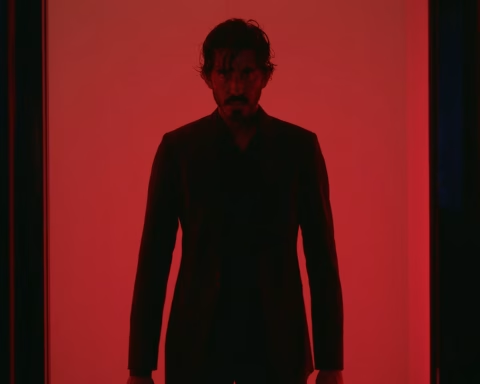
My first drink seemed to unlock something. I threw up, went home, woke up with a stinking hangover and thought, ‘that was fantastic, when are we doing it again?”
Blackout, directed and designed by Paul Brotherston, is an insightful, yet dark journey into the whirlwind of alcoholism, and how the addiction can put you through a personal heaven and hell.
Written by Mark Jeary, a recovering alcoholic, the performance included five actors: Mark Jeary, Camille Marmié, Ben Clifford, Miriam Sarah Doren and Beth Kovarik.
There was no story per se, but the production included two combined mediums of communication. Firstly, there were recorded voiceovers from interviews with alcoholics or recovering alcoholics, talking about their experiences at the hand of drink.
Secondly, it also had the cast speaking through hand held microphones and telling the verbatim story of some of the interviewees and subtly revealing the progressive problems they have faced.
The performance had a strong black comedy element to it, and despite its many funny moments, the content was very unsettling and left the audience squirming in their seats.
The stories were very heart-wrenching, and it was interesting to see that despite the fun these people had gotten from drink, a reliance on it had clearly disintegrated each and every one of their lives.
The narratives began with a happy reminiscence of alcohol and those interviewed talked about the almost super hero like qualities they gained from drink. They told stories about their sense of energy, excitement, bravery and confidence that they were desperately seeking.
However, it became apparent that over time, the drink took a very ugly turn. Everyone involved ended up facing one or more of the problems of: severe physical and mental illness, sexual abuse, job insecurity, bursts of violence, separation from family and loved ones, arrests and suicide attempts.
It was important to note that cast dwelt on the idea that most alcoholics don’t think they are one. They have an image in their head of someone they’ve known intimately, or seen in the media, and they do not associate themselves with that, thus showing that alcoholism can develop for a number of reasons and in a number of ways and can creep up very gradually from unnoticed corners.
The title of the piece, not only considers the literal blackout that alcoholics can have, but resonates the way in which alcohol and drunkenness can take away a person’s control and awareness of their own immediate and wider lives. This of course can lead to significant shocks, and naturally, you pour another glass to deal with it.
Overall, Blackout was a very engaging performance and one which has a great deal of value and relevance for a wide audience.
The presentation was simple, yet effective. The use of recorded voice overs really helped the audience to realise that the event was not based on fiction, but that these stories and experiences were authentic and the struggle of alcoholism was very real in all walks of life.
The use of the shadowing affect added a darkened mood to the room. The decision to use of microphones and have one cast member speaking at a time created a private feel to the performance and almost made it appear like an event where someone would be doing stand-up comedy, and it added a sense of loneliness and irony to it all.
This is certainly a theatre event to see if you want to learn more about the highs and lows of drinking in an intimate environment. With a post-production discussion, Blackout seeks to explore the problems alcohol creates in a 2016 environment.





